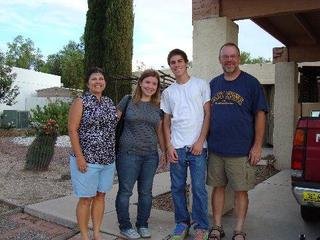Thursday, May 08, 2008
Sunday is a two-fer
Our study Sunday will continue our "What did Jesus say about..." series and will be themed for Pentecost. The study is "What did Jesus say about the Holy Spirit".
The worship bulletin has some info about Pentecost and all the Scriptures.
My boy is sixteen
Wednesday, May 07, 2008
The Problem of Pain
An article from Relevant Magazine's email has some good insight on the subject also.
I recently received this email:
“Lately I've felt like there is no point to living life. Everyone I talk to says, ‘Well, that's just how life is.’ I understand it's going to be difficult, but my question is, why bother? People also say, find what makes me happy, but nothing makes me truly happy.”
Let’s cut to the chase: However you might currently be seeking them, we all want love, peace, freedom, fulfillment and contentment in every moment. But that doesn’t happen, does it? You work hard; the payoff is small. We desire and seek these realities, but they are fleeting.
My logic was that I could achieve these things through God, and more specifically by being a “good Christian.” Didn’t work.
Go out and apply every formula for living a happy life: Become wealthy, accomplish great success, be devoutly religious, achieve the perfect body, save the rain forests, find Mr. or Mrs. Right, climb Mount Everest, purchase a Yamaha R6, double your Facebook friends—whatever floats your boat. Do it all! Doesn’t work. Won’t satisfy. It will never produce the life you want.
Just as life circumstances can produce temporary bouts of happiness, they can also produce experiences of pain. But there is a difference between “pain” and “suffering.” Pain is a natural response to life circumstances; suffering stems from depending upon these circumstances as our source for well-being. For example, if you don’t get the record deal, you will naturally be painfully disappointed because it’s something you desired. However, if you are depending upon getting the record deal as the source of your happiness in life, you will be utterly devastated. See the difference?
The life of Jesus is the most compelling example. Few people will ever endure the extent of physical pain inflicted upon Jesus or be so utterly rejected and despised as Jesus. And yet Jesus was always at peace. Why? Because the source of Jesus’ peace was not His human circumstances but eternal reality. Until recently, I didn’t realize that I could have this peace, too—and not only that, but it is within me and has been within me all along.
When Jesus said that the peace He gives “is not as the world gives,” He was seeking to awaken people to a whole other dimension of life, which, by the way, is worth living. Life circumstances or bargaining with God through religion or whatever won't work! Jesus laid out all the essential truth by saying, “The Kingdom of God is within you.” Jesus identified the only source for abundant or eternal life, the “Kingdom of God,” and then showed us its location: “within.” His point is not that eternal reality is like a magic ball floating somewhere inside our human body. He’s saying that the frequency of eternal reality is an immaterial and invisible energy or life that flows within us.
Can you be at peace in a room where nobody gives you the time of day? Yes, because the source of peace is not whether people ignore or dismiss you. The source of peace is on another frequency, which you can tune into if you want to. You can choose to be at peace no matter the circumstance, but it’s a choice you have to make for yourself. We each have free will to participate in the present reality of God’s Kingdom.
You say, “It can’t be that simple.” But why should God, eternal reality, truth and the life worth living that Jesus came to give be complicated, difficult and only attainable by a few highly knowledgeable and enlightened people?
I chased the carrot for many years through theological knowledge, ministry success, a daily regimen of spiritual disciplines, church commitments and social activism. It’s not that any of these things were wrong, or that they had no value, but what I was seeking to gain through them was still searching for eternal reality on the wrong frequency. A lot of people are trying to squeeze God into their current way of doing life through religion. God wants you to experience another life altogether.
Author: Jim Palmer
Jim Palmer is the author of Divine Nobodies and Wide Open Spaces, and can be reached at jim@divinenobodies.com.
Also, check out this discussion. Go to the link to follow the discussion.
Is Our Pain God's Problem?
Brian McLaren's take on the debate
Melvin Bray's thoughts on the debate
